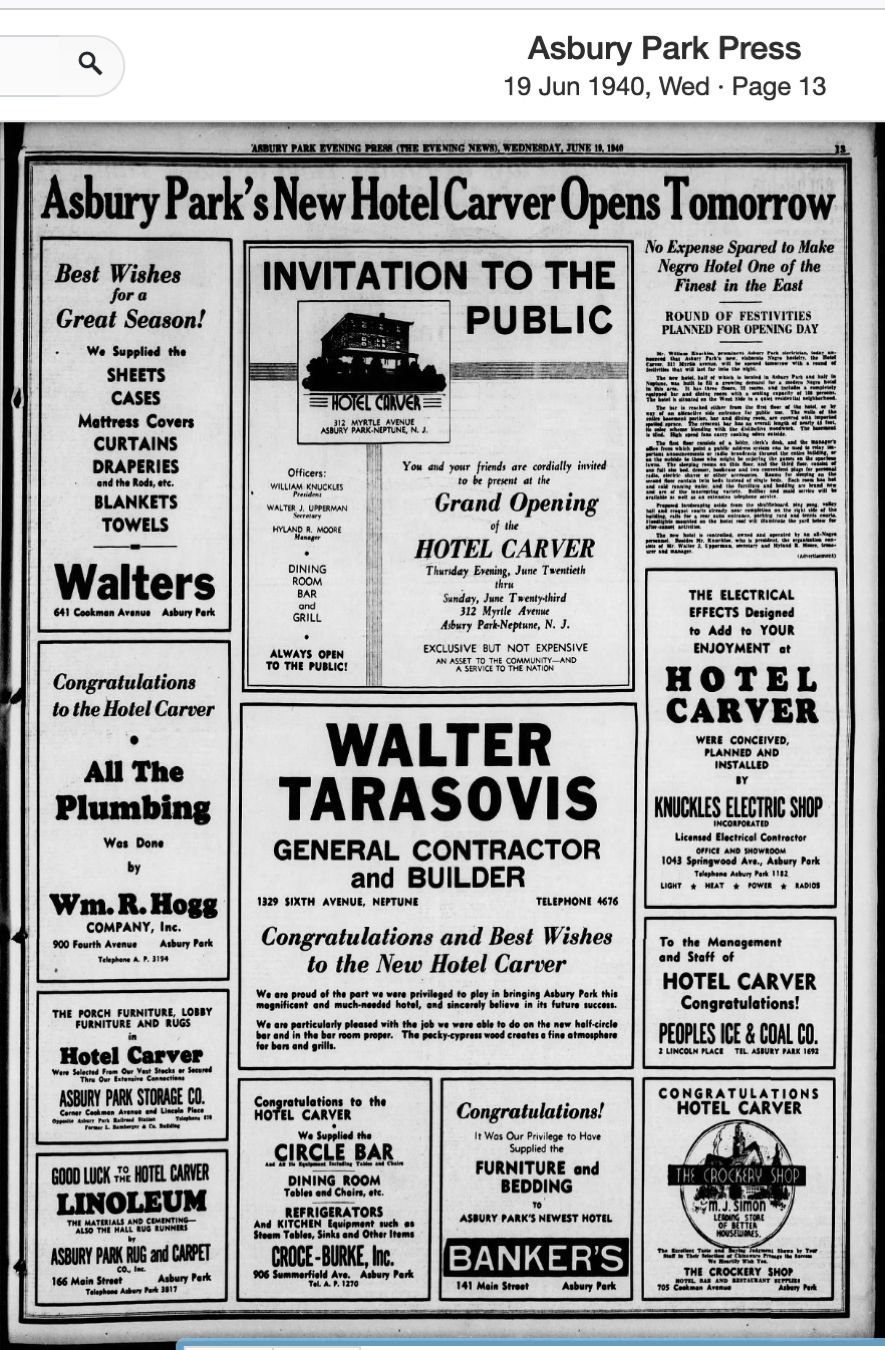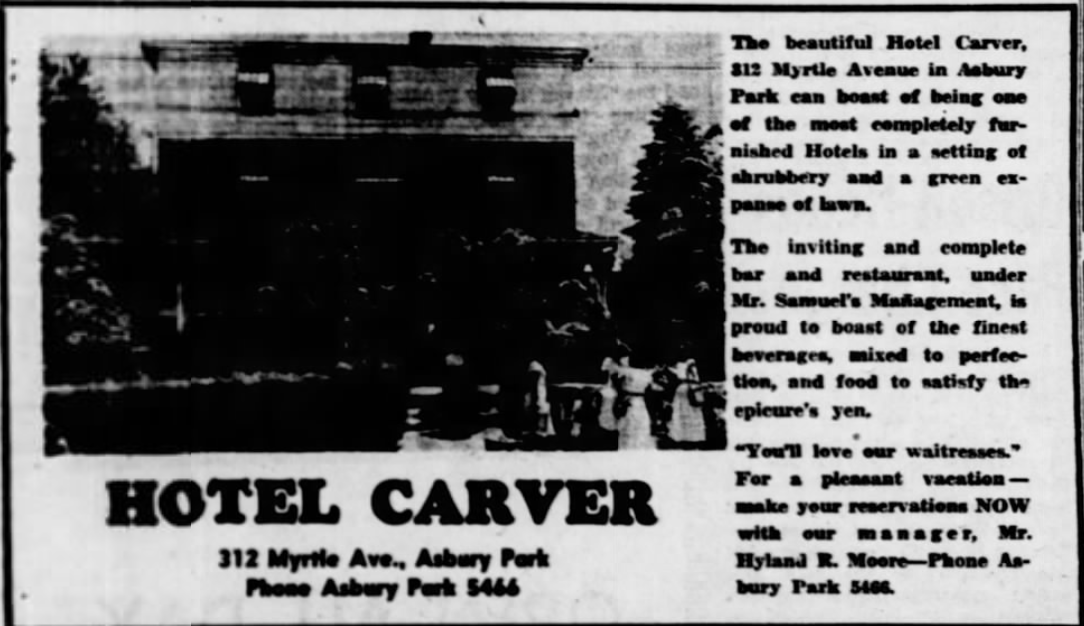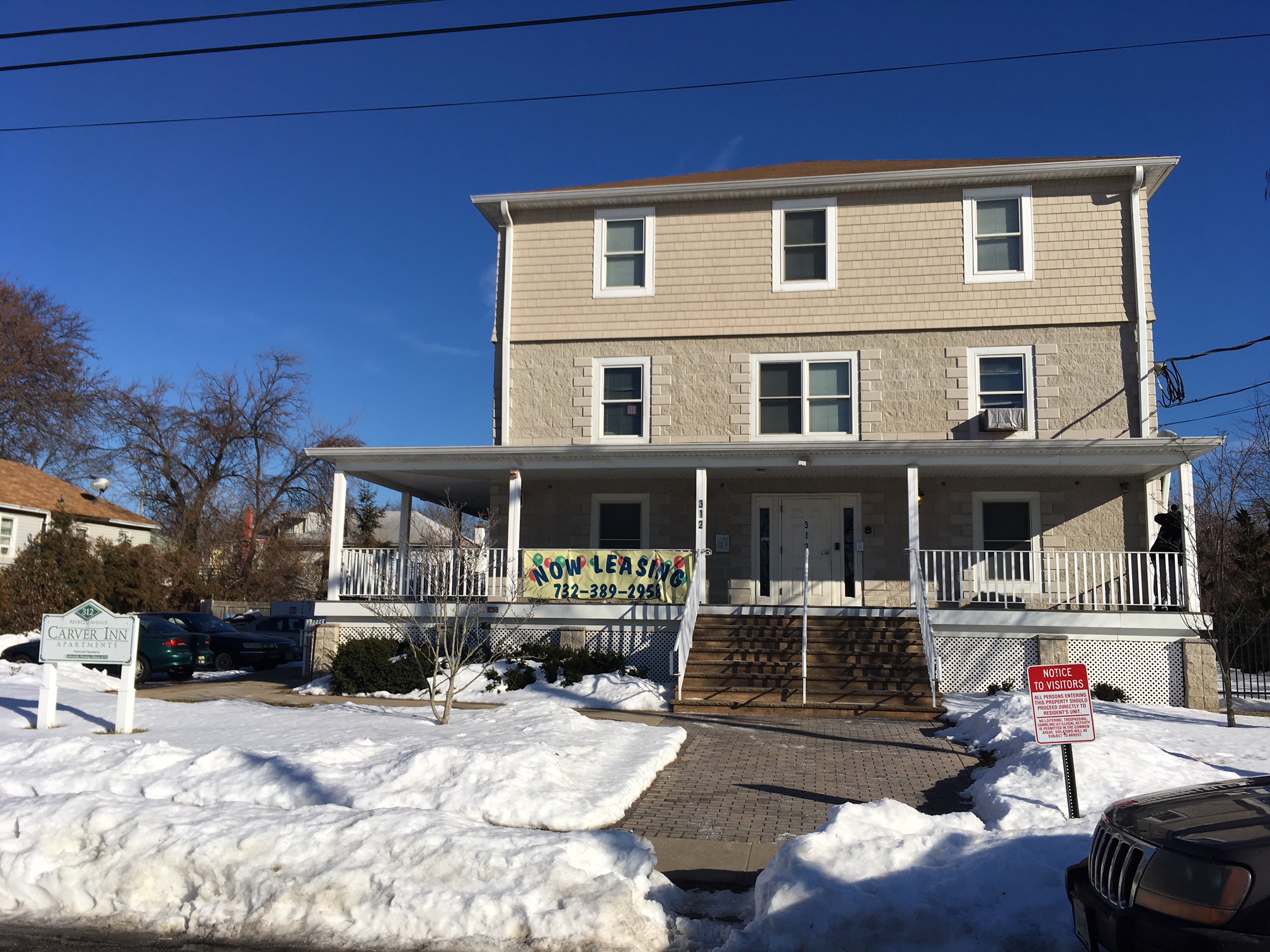Hotel Carver
Known Name(s)
Hotel Carver
Address
312 Myrtle Asbury Park, NJ
Establishment Type(s)
Hotel, Resort
Physical Status
Demolished
Description
The Carver, which renovated an existing building, was a large, rectangular, three-story cement-block and frame building with a one-story wooden porch across the façade that then wrapped to the north. The building burned down in 1999, and is remembered today in the Carver Inn Apartments. Built in 2008 on the site, the apartment building echoes the form and façade of its famed predecessor.
Sources: Sanborn Map Co., Insurance Maps of New Jersey Coast, New Jersey, Vol. 2 (1930), sheet 248; Bill Bowman, “Carver Inn reborn as apartment complex,” Asbury Park Press, 5 June 2008.
Detailed History
The fabled and fashionable Hotel Carver was a premier destination on the West Side for both locals and visitors. Located just off Springwood Avenue, on the Neptune side of the Neptune-Asbury Park border at 312 Myrtle, the Carver was listed in The Green Book from 1949 through 1962 as a vacation resort.
The hotel, a local institution, was the venue for numerous community organization meetings and events, lawn parties, and civic as well as family gatherings. The Asbury Park Press followed who came and went from the Carver during the vacation season. It was the hotel of choice for upscale African-American visitors, and particularly for musicians performing at Springwood Avenue’s famed clubs; guests included Count Basie, Cab Calloway and Lena Horne.
The Hotel Carver opened in 1940, its purpose, stated in a full-page advertisement in the Asbury Park Press, “to fill the growing demand for a modern Negro hotel in the area.” Advertised at its opening as “controlled, owned and operated by an all-Negro-personnel,” the establishment was associated with three, prominent civic leaders instrumental in championing their West Side African-American community: William Knuckles, a successful businessman who owned an electrical store on Springwood Avenue; Walter J. Upperman, an attorney who practiced on the West Side; and Hyland R. Moore, the principal of the Bangs Avenue School, located on the West Side.
Touted in the full-page ad inviting the public to its grand opening as a “new, elaborate Negro hostelry” that was “an asset to the community – and a service to the nation,” the opening ceremony brought prominent African Americans from around the East Coast to the West Side. The hotel – “exclusive but not expensive” – had numerous amenities, including a bar and dining room seating 100, hot and cold running water in every room, bellboy and maid service, telephone access, and a public address system. The Carver placed a prominent ad in a 1949 article in The New York Age that celebrated Asbury Park as an “ideal” vacation spot for African Americans, the text characterizing the business as “one of the most completely furnished Hotels in a setting of shrubbery and green expanse of lawn.” The hotel indeed was sited to one side of a series of lots, providing ample room for outdoor leisure as well as lawn parties.
As the fortunes of the Jersey shore in general and the West Side in particular changed, the hotel took on weekly residents in the 1970s, and then became a boarding house in the 1980s. In 1999, a devasting fire engulfed the building. The derelict structure was slated for renovation in 2003 as affordable housing for seniors. The compromised building, however, could not be saved, and was therefore demolished. The celebrated Hotel Carver is remembered today in the Carver Inn Apartments, built in 2008 on the site.
Sources: Dianna Harris, President, MURC, Neptune, NJ (in conversation); “Asbury Park Ideal Vacation Spot Now,” The New York Age, 30 July 1949; “Asbury Park’s New Hotel Carver Opens Tomorrow,” Asbury Park Press, 19 June 1940; Bill Bowman, “Carver Inn reborn as apartment complex,” Asbury Park Press, 5 June 2008; “Burned-out landlady seeks help for members of Carver ‘family,’” Asbury Park Press, 12 December 1999; “Ex-hotel to get $1.6M face lift. Derelict Neptune building targeted to become senior housing,” Asbury Park Press, 28 May 2003; “Hotel Carver to Open in City,” Asbury Park Press, 19 June 1940; Nancy Shields, “Civic leader remembered for helping others,” Asbury Park Press, 15 April 1990; “Walter J. Upperman; Neptune Lawyer, 66,” Asbury Park Press, 23 January 1973; “William ‘Bill’ Knuckles, Asbury Park civic leader,” Asbury Park Press, 13 April 1990; “William Knuckles Got Chance Here, Now He Helps Others,” Asbury Park Press, 12 October 1952.
J. Shaffer






